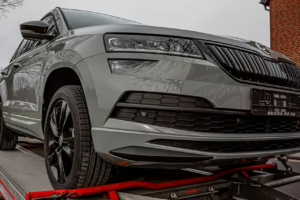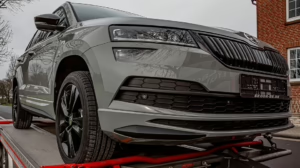Electric Dreams: Top Car Brands Embracing EV Technology and What It Means for Drivers
As the world pivots toward sustainability, the automotive industry is undergoing a seismic shift with electric vehicles (EVs) taking center stage. The push for greener alternatives has driven major car brands to embrace EV technology, fundamentally changing the landscape of personal transportation. This article explores some of the top car brands leading the charge in electric mobility and what it means for drivers.
Why the Shift to Electric?
The motivation behind this transition is multifaceted. Environmentally, the reduction of greenhouse gas emissions is a significant factor, as transportation accounts for a large percentage of global emissions. According to the International Energy Agency (IEA), the transport sector contributes nearly 24% of total greenhouse gas emissions in the EU region alone. This has catalyzed governments globally to enforce stricter regulations on fossil-fuel vehicles, incentivizing both manufacturers and consumers to switch to electric.
Economically, the transition to EVs is increasingly being spurred by innovations that reduce production costs, making electric vehicles more accessible. Manufacturers are also responding to changing consumer preferences, with many drivers seeking sustainable alternatives that align with their values. As people become more environmentally conscious, the demand for electric vehicles has surged, prompting automakers to ramp up their efforts to provide innovative, sustainable options.
Top Car Brands Embracing EV Technology
1. Tesla
Tesla has long been a trailblazer in the EV market, thanks to its innovative technology, extensive charging network, and high-performance models. The Tesla Model S and Model 3 have set benchmarks for range and efficiency, making electric driving practical for daily use. The company’s commitment to software updates ensures that vehicles continuously improve over time, a feature that many traditional car manufacturers are only beginning to embrace. For drivers, owning a Tesla means access to cutting-edge tech features and the promise of a growing network of Superchargers, facilitating long-distance travel.
2. Ford
Ford has made significant strides with its Mustang Mach-E and the upcoming all-electric Ford F-150 Lightning. These models embody the brand’s commitment to performance and utility, offering impressive range and charging capabilities. The Mustang Mach-E proves that electric performance can be thrilling, while the F-150 Lightning aims to retain the utility of its gasoline counterpart while being eco-friendly. For traditional Ford drivers, this transition means a familiar yet modern driving experience without sacrificing comfort or functionality.
3. Volkswagen
With its ambitious ID.4, Volkswagen is shifting gears towards electrification, aiming to lead the mass market in EV sales. The ID.4 offers an affordable, family-friendly SUV option with an appealing design and spacious interior. Volkswagen plans to invest over $40 billion in electric technology over the next few years and is building an extensive charging network to support these efforts. For consumers, this means accessing EV technology without the premium price tag typically associated with early adopters, making it easier to choose electric.
4. Hyundai
Hyundai has significantly invested in electric mobility with its Ioniq and Kona Electric models. The company’s dedication to research and development sees it continuously pushing boundaries in range and efficiency. The upcoming Ioniq 5 features a retro-futuristic design and advanced technology and offers a spacious interior that caters to family needs. For drivers, Hyundai offers a blend of affordability, performance, and advanced tech features, making EVs more accessible than ever.
5. Nissan
Nissan was one of the first mainstream automakers to offer an all-electric vehicle with the Leaf, which remains popular for urban drivers. The company is also investing in new technologies and models to reinforce its position in the EV market. The Leaf has proven to be an economical choice for city driving, offering easy maneuverability and lower operating costs. As Nissan expands its lineup, consumers can look forward to more innovative electric options that connect with their daily driving needs.
6. BMW
BMW’s i3 and the upcoming iX models represent the brand’s commitment to sustainable luxury without compromising on performance. BMW seeks to maintain its reputation for sporty driving dynamics while venturing into the electric territory. The iX boasts a futuristic design and encapsulates the essence of luxury with its interior craftsmanship. For drivers, BMW’s approach means they don’t have to sacrifice the joy of driving while contributing to environmental efforts.
7. Audi
Audi has been making strides with its e-tron lineup, balancing luxury, performance, and electric efficiency. With impressive range and advanced technology, drivers looking for a premium experience can enjoy the sophistication of an Audi while benefitting from EV ownership. The brand’s innovative approaches to design and technology demonstrate that luxury does not have to comprise sustainability.
What This Means for Drivers
1. Increased Choices
As more brands enter the EV market, drivers are presented with a broader variety of options catering to different needs and budgets. Whether you’re looking for a sporty performance car or a family-friendly SUV, there’s likely an electric model that fits the bill. This abundance not only enhances competition among brands but also motivates them to innovate faster.
2. Improved Technology
Electric vehicles often come equipped with the latest tech features, such as advanced infotainment systems, driver-assistance technologies, and over-the-air updates. This enhances the driving experience, providing more convenience and safety. From in-car navigation that optimizes charging stops to smart features that integrate with mobile apps, EV technology is often more advanced than what is available in traditional vehicles.
3. Lower Operating Costs
While the initial purchase price of an EV can be higher, the lower costs associated with maintenance, charging, and the absence of gasoline can ultimately save drivers money in the long run. Many governments also offer incentives, such as tax credits and rebates, making EVs more economically attractive. Additionally, many EV owners find that their overall operating costs decrease significantly compared to traditional gasoline vehicles.
4. Sustainability
By choosing an electric vehicle, drivers contribute to reducing carbon emissions and may find a sense of community among fellow eco-conscious consumers. There’s a growing network of EV owners who actively support sustainability efforts, enhancing their connection to the environmental movement. This shift not only benefits individual drivers but also has a larger impact on societal norms regarding transportation and environmental responsibility.
5. Infrastructure Changes
As demand for EVs continues to grow, the infrastructure for charging stations is also expanding. Drivers can expect to see more public charging stations in urban areas and along highways, making long-distance travel more feasible than ever before. Furthermore, many companies are installing charging stations at workplaces, making it easy for employees to maintain their electric vehicles throughout the workday.
Conclusion
The automotive industry is on the brink of an electric revolution, with leading car brands embracing EV technology to meet the changing needs of consumers and the environment. For drivers, this shift means greater choices, advanced technology, and a concrete step toward a more sustainable future. As automakers continue to innovate and adapt, the dream of electric mobility is rapidly becoming a reality, setting the stage for a more sustainable and technologically advanced automotive industry.
The transition to electric vehicles is more than just a trend; it represents a historical movement towards preserving our planet for future generations. As more brands step up their EV offerings, drivers will have the opportunity to align their transportation choices with their values, contributing to a cleaner and greener world. The electric dream is unfolding, and it offers immense possibilities for the future of personal transportation.


























Add Comment